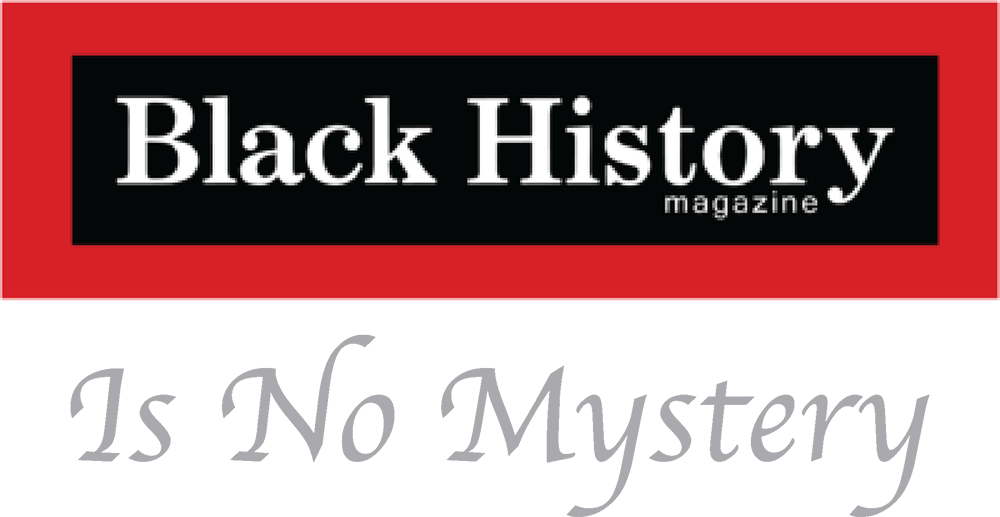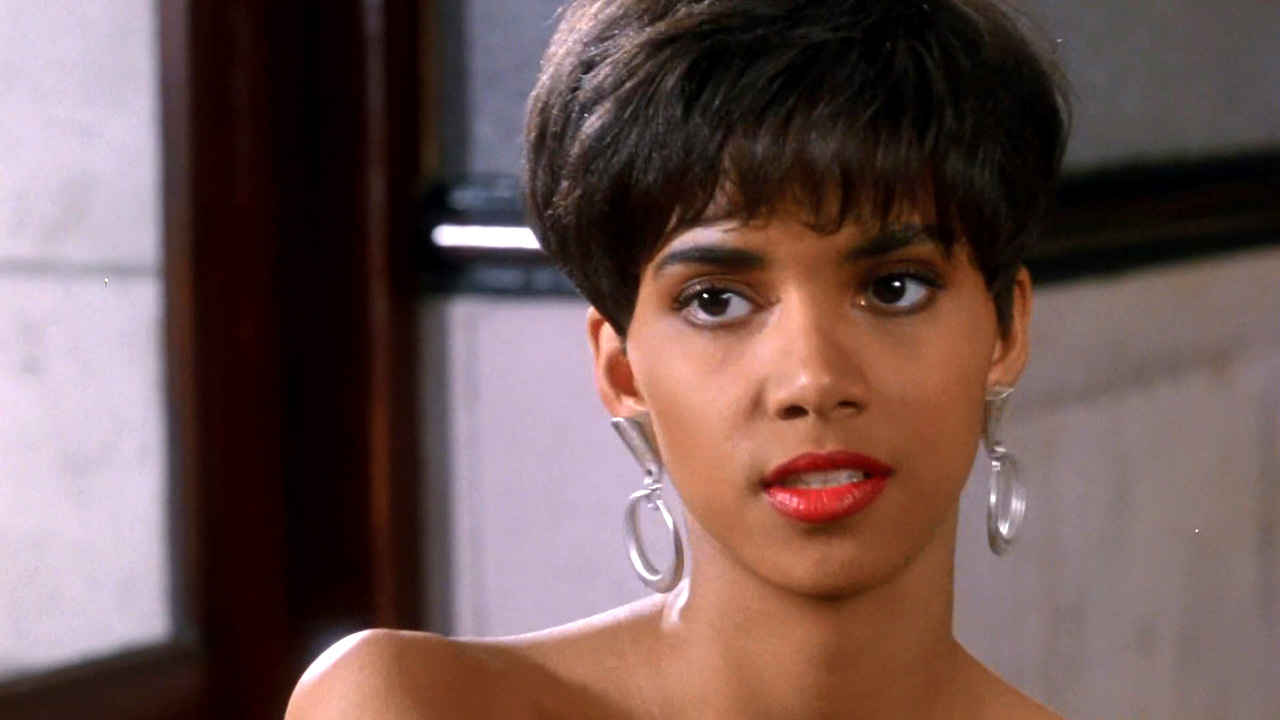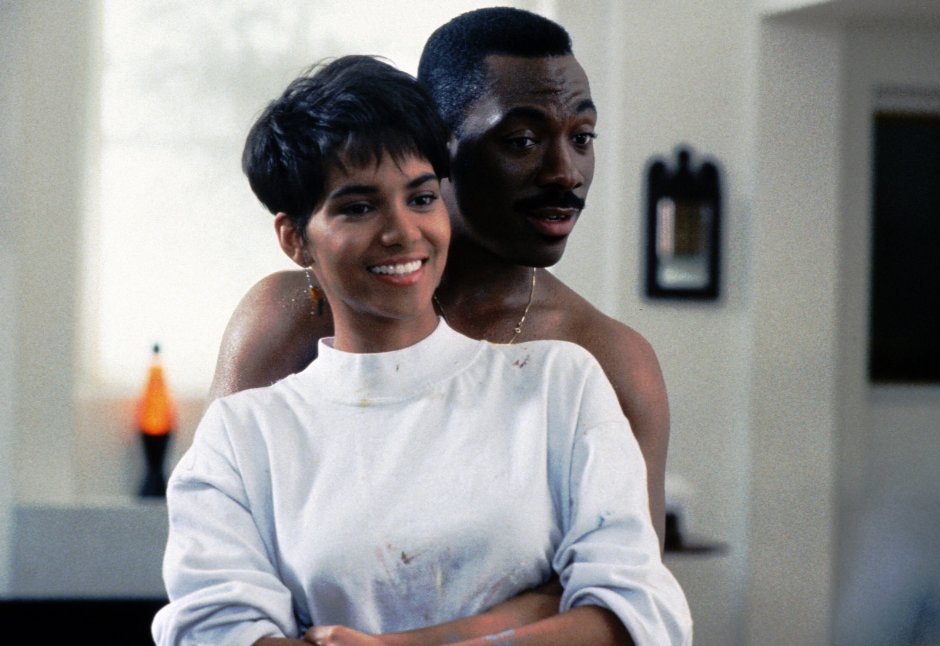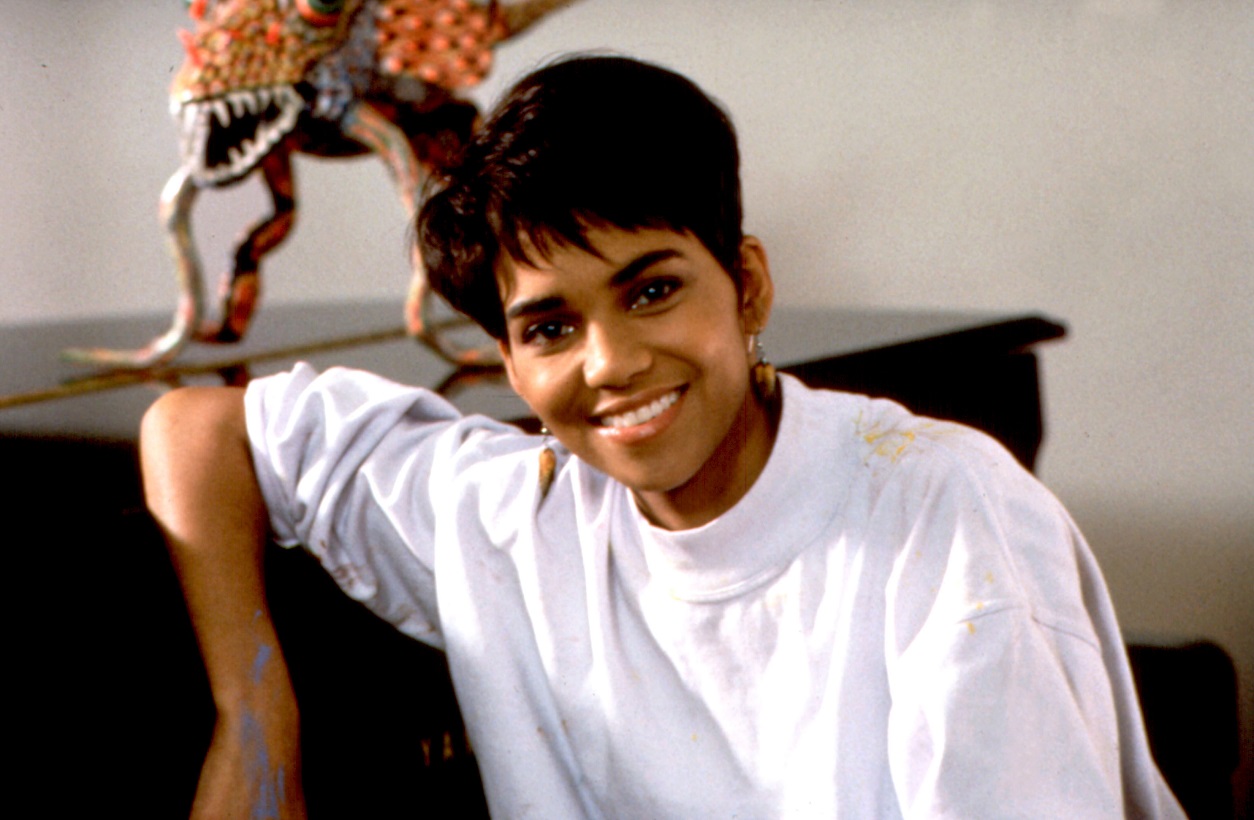Life as an Up and Coming Superstar In 1993
“It’s time for…Black women to start taking a stand. And if we stop taking those kinds of roles they keep offering us, if nobody will do it, they won’t be able to just offer them to us….” Halle Berry,
Quest: Very good. I’m going to cut on this thing while we tape. Is that okay with you?
Halle Berry: Uh-huh.
Quest: I am really happy to see that you’ve got a lot of projects going on.
Halle Berry: Well, thank you. . .it’s rough right now.
Quest: Are you over your cold?
Halle Berry: I’m getting over it. I’ve had a lot of complications lately with my health, but I’m . . .Just not getting enough rest, doing too many things.
Quest: Me too. I have to get rid of this cough that I have. But other than that, it’s cool. By the way, you were working with a director, a classmate of mine, Reggie Hudlin.
Halle Berry: Oh, really?
Quest: Yeah, yeah. I remember when he shot “House Party” about two blocks from here.
Halle Berry: Really? Gizmo. We call him Gizmo.
Halle 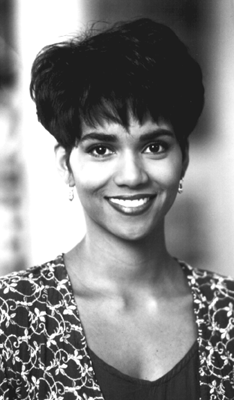 Berry – And I think that is because I got a strong sense of my heritage and my culture and who I am from my mother, who is White. I mean, she knew the importance of making sure I wasn’t torn between am I Black or White or trying to be White when I’m really Black.
Berry – And I think that is because I got a strong sense of my heritage and my culture and who I am from my mother, who is White. I mean, she knew the importance of making sure I wasn’t torn between am I Black or White or trying to be White when I’m really Black.
Quest: Gizmo because of that beard, huh?
Halle Berry: Because he looks like a little Gizmo.
Quest: I’m telling you, I saw him at–were you at the Ceba’s?
Halle Berry: No.
Quest: I saw him there. That’s the last time I talked to him. Well, first of all, where are you from? For the readers, could you tell us where you’re from?
Halle Berry: Well, I was born in Cleveland, Ohio. I grew up in a suburb called Bedford, but I live in Los Angeles right now.
Quest: Okay. So you’re not living in New York then, right?
Halle Berry: I”m there working on the movie Boomerang, but I live in Los Angeles.
Quest: How’s the movie coming?
Halle Berry: The movie’s going well. It’s going really well. Everybody’s a lot of fun. Eddie’s a lot of fun. . .very funny. Reggie’ s great. Morrissey’s great. You know, there’s Chris Rock, Martin Lawrence, David Alan Grier. They’re three of the funniest new guys, you know, with new comedy from “In Living Color,” and they’ve got that freshness about them that’s a lot of fun.
Quest: That sounds good. What is the movie about, or can you tell us at this point?
Halle Berry: It’s a comedy, of course, and it’s about Eddie finding love in the nineties.
Quest: Finding love in the nineties.
Halle Berry: Right. Finding love and all the things you go through to do that.
Quest: How did Boomerang come about? You know, the first movie you did was-I forget the name of it now.
Halle Berry: Jungle Fever.
Halle Berry – I think actors think, ‘If I can just get a movie then I’ll be okay.’ But it’s like once you do one thing, then there’s pressure to do the next thing —
Quest: Jungle Fever, right. And how did that all come about?
Halle Berry: Jungle Fever? My agent just sent me in on an audition. Spike [Lee] was in Los Angeles for a week auditioning women for all the female roles in the movie, and I went in and auditioned. I originally read to play the part of his wife Vera, and he said, “No, I think you’re going to be the crack addict.” So I had to go in the bathroom and wash off all my makeup and come out and read the other part, and I did. And he offered me that part.
Quest: That’s really good. I mean, you did a very good job there.
Halle Berry: Thanks.
Quest: I remember reading that you said that you didn’t really agree with the message of that particular movie. What is your feeling about that?
Halle Berry: I am totally opposed to that view because I’m a product of an interracial marriage. So I’m a firm believer that there can be such a thing as interracial love and it’s real and it exists and that people can function in an interracial relationship and be very happy. So the fact that Spike was saying that people get together from the Black and White race because of the parts of the anatomy or whatever, that may be true. I mean, I can’t speak for those people. But I know for a fact, my experience of this, there are Black and White people that can really just love each other as people and be very happy.
Halle Berry – So the fact that Spike was saying that people get together from the Black and White race because of the parts of the anatomy or whatever, that may be true. I mean, I can’t speak for those people. But I know for a fact, my experience of this, there are Black and White people that can really just love each other —
Quest: So good is not a color, it’s an action.
Halle Berry: Yeah, it’s an action. Even though I didn’t agree, I respect Spike because that’s his opinion. If that’s his reality, then it’s worth listening to and it’s worth seeing and it’s worth making a movie about. And then one day maybe I’ll make a movie about the reverse and that will be my opinion and he should have to respect that too.
Quest: Talking about your movie now, I understand you’re writing one, right?
Halle Berry: Yes, I just finished one called Inside Out.
Quest: Inside Out. What’s that about?
Halle Berry: I don’t want to say too much because it’s not copy-written yet, but it’s a suspense thriller, and it’s a great role for a Black woman and for a White man, but it’s not a love relationship. They’re not in love. It’s just bringing together the two races in a film. So it’s not a Black film or a White film. It’s just a film about people. And it’s got a twister. There’s a murder involved, There’s some comedy. . .
Quest: I’ll tell you mine. I’ve just written a movie called Just Like That.
Halle Berry: Oh, really.
Quest: Yeah. I’m telling you, one of these days hopefully I’ll send it to you and let you take a look at it.
Halle Berry: I hope you do.
Quest: Yeah, it’s got a good role for a woman, a Black woman.
Halle Berry: That’s the thing. Like, today I’m really not interested in doing anything that is not a positive role for a Black woman. I think I’ve paid my dues and I’ve played the exotic dancer. It’s time for, you know, Black women to start taking a stand. And if we stop taking those kinds of roles they keep offering us, if nobody will do it, they won’t be able to just offer them to us.
Halle Berry-And if that’s his reality, then it’s worth listening and it’s worth seeing and it’s worth making a movie about. And then one day maybe I’ll make a movie about the reverse and that will be my opinion and he should have to respect that too.
Quest: Okay. Let me ask you this, what about women filmmakers? What is the future of Black women filmmakers? You know, we see so much with Reggie, with Spike Lee, with John Singleton and some other directors there, Charles Lane;yet we don’t hear that much about Uzana Pasley and about Julie Dash and filmmakers like that. What do you see as the future for women filmmakers?
Halle Berry: I think they will be recognized when they can make a product like a Boyz In The Hood or a Do The Right Thing. They have to do something that’s noteworthy in that the bottom line is “Make money in the box office.” When they do that, then they will also be in the money with Spike Lee and John Singleton. Until that happens, it’s just-they’ve got to prove themselves, and we should have to. We should have to. Nobody should give Black women anything. We should have to go out there and prove ourselves, and I’m just hoping that we’re going to do that.
Quest: What would be a strong woman role? I mean, give me an example.
Halle Berry: I would love to play Angela Davis in her life story.
Quest: Oh, yeah? I just saw her last week over at Harvard.
Halle Berry: Really? I admire her so much, and I think that could be done now because she’s still alive. So it could bring a lot of reality to the screenplay, and I think it’s an important story that should be told.
Quest: Maybe that’s one you should write.
Halle Berry: Well, actually there are things written right now I actually have been looking at, I even may be doing that soon so that’s something on the back burner.
Quest: Oh, man, that will be exciting.
Halle Berry: Yeah.
Quest: Okay. Well, let me ask you this: Who was the first historical figure that you can remember influencing you personally?
Halle Berry: Historical figure? I think I’d have to say Harriet Tubman.
Halle Berry – It’s time for, you know, Black women to start taking a stand. And if we stop taking those kinds of roles they keep offering us, if nobody will do it, they won’t be able to just offer them to us.
Quest: Why is that?
Halle Berry: That’s something that sticks out in my mind from when I was a child, part of my history classes that I remember the most about any Black person in history. She’s one of the people that I remember the most as being a strong Black woman.
Quest: Did you see the movie about her with Cicely Tyson?
Halle Berry: Yes.
Quest: That was a very good role there. I really liked that. Who was the first Black actress, you know, who was a role model for you that influenced you to go into film?
Halle Berry: I’d probably have to say Cicely Tyson as well. I remember seeing her in Sounder, her along with Kevin Hooks. That made a big impression on me.
Quest: He directed your movie, didn’t he?
Halle Berry: Yeah, he did. It’s neat to be able to work with him because my sister and I used to-I used to be Kevin actually and she used to be Laura, the girl that played Kevin’s sister. We’d do their little scenes that they had together in the living room together, so I got to tell him all about it. So that was really fun, being able to work with Kevin.
Quest: When did you see Sounder?
Halle Berry: When I was little. But my sister and I–I was interested in acting then. I’d make her do the roles with me, and I used to try to make her be the role that Kevin played and she wouldn’t do it, so I’d be the man role and she’d be the girl role.
Quest: So how did you get started in acting? I know you were a Miss America, you were–
Halle Berry: Miss U.S.A.
Halle Berry – I started to laugh, and I spit water all in his face and down his shirt. And after we got done, the whole place, like, went silent. You know, they didn’t know how Eddie was going to react. I just spit in his face…
Quest: Miss U.SA. I’m sorry. Did you know before then that you wanted to do acting or was that something that came along after that?
Halle Berry: No, I sort of knew before that. But I did the pageant mainly for the money to, you know, be able to leave Cleveland and have money behind me so I could move to Chicago where I wanted to go. I got to Chicago and I started to model for the money so I could pay for my acting classes.
Quest: How did you like Chicago?
Halle Berry: I loved Chicago.
Quest: What about your family? What do your father and mother do?
Halle Berry: My father left when I was four, so I really don’t deal with that part of my family. My mother is a registered nurse, and I have an older sister Heidi. She’s trying to become a police woman.
Quest: What was Cleveland like growing up for you?
Halle Berry: Cleveland was a great place to grow up. I grew up in a very mixed integrated neighborhood. I think I had a real balance in my life because I didn’t grow up in an all-White neighborhood. It was mixed. Seeing that my mother is White and my father was the one that was Black and he left, it made it harder. I think I had a real balance in my life because I didn’t grow up in an all-White neighborhood. It was mixed. It was probably leading towards more of a Black than a White neighborhood. So I got a real balance, and it was good. I had childhood problems, but everybody has problems.
Quest: Really, what? Like, someone would call you a name?
Halle Berry: Well, like “Zebra,” or something interracial. You know, people don’t understand. When my mother would show up at open house, she’d be White. They don’t understand, so–but it wasn’t that bad.
Quest: How did you develop self-esteem?
Halle Berry: My mother gave me a real sense of self and explained to me why they were doing that, that they didn’t understand and it didn’t make me any less Black or less like them. It was just my mother was White but I was Black, and they didn’t understand that.
Quest: Most people would just assume that you were Black.
Halle Berry: Yeah. I think that is because I got a strong sense of my heritage and my culture and who I am from my mother, who is White. I mean, she knew the importance of making sure I wasn’t torn between “Am I Black or White, or am I trying to be White when I’m really Black.”
Quest: Right.
Halle Berry: You know, she let me be me, and made me aware of Black history and who I was. Even my father’s side of the family, they chose not to be there. We didn’t choose for them not to be there. But she made sure that I had pictures and knew who they were and knew I had a name. So I was pretty connected to them even though I wasn’t in a way.
Quest: How do you deal with the pressures of success now? You have a very successful movie under your belt, and now you’re doing another one.
Halle Berry: Well, you know, I think actors think, “If I can just get a movie then I’ll be okay.” But it’s like once you do one thing, then there’s pressure to do the next thing and do it better than the thing before. So the pressure gets greater. The odds and the stakes get higher as the pressure gets greater. And now it’s pressure to do another project that does just as well and maybe a better project. You know, you have to keep trying to do better things. So there’s a lot of pressure.
Quest: So for instance, on the set with Boomerang, you had said something about being just a little bit nervous dealing with Eddie [Murphy], you know, for the audition, but it turned out really well.
Halle Berry: Oh, yeah. He’s…want to hear something really funny that happened? The other day we were…Eddie and I have a love scene and we never rehearsed it.
Quest: I’m jealous, by the way.
Halle Berry: Don’t be.
Quest: Okay, go ahead.
Halle Berry: We never rehearsed this love scene ever in rehearsal. I don’t know why, but we just didn’t. So I was lying on his chest and I asked the makeup artist before I had to kiss him to bring me a glass of water. So she brought the water over. I took a sip out of it, and before I swallowed it, I looked up at him and I was looking up at an angle.
Halle Berry-He came to the set of “Boomerang” and we were all like just little kids. We were like,”Oh,my God. That’s John Singleton.” He was really cool and very gracious to talk to and took pictures with us.
Quest: Yeah, right.
Halle Berry: So I could look up his nose, and Eddie has gray hairs growing in his nose, and I started to laugh, and I spit water all in his face and down his shirt. After we got done, the whole place, went silent. You know, they didn’t know how Eddie was going to react. I just spit in his face. So he started busting out laughing and he got hysterical and then everybody laughed. But at first they didn’t know if he was going to-
Quest: Everyone’s going “Oh, no!”
Halle Berry: Or, “Is he going to walk off the set?” But I wasn’t expecting him to have gray hairs up his nose. You know, it was one of those things that I just couldn’t control.
Quest: Oh, man, that’s funny.
Halle Berry: That’s the highlight of 1991: “I spit in Eddie Murphy’s face. ”
Quest: Well, hey, this interview is over as far as I’m concerned.
Halle Berry: Well, thank you.
Quest: Yeah. If I sent you a script, would you take a look at it?
Halle Berry: I’d love to. Please do.
Quest: Yeah, just tell me what you think of it.
Halle Berry: Okay. Great. We have to stick together. That what it’s all about. I’ll look forward to reading it .
Quest: I am really happy that Reggie, Spike and John [Singleton] are doing so well. What did Boyz In the Hood make? 55 million? Really great to see his success…
Halle Berry: He came to the set of “Boomerang” and we were all like just little kids. We were like , “Oh, my God! That’s John Singleton!” He was really cool and very easy to talk to. He took pictures with us.
Quest: Black History is interviewing him this week. Well, I’ll talk to you. You keep in touch with us, let us know what’s going on. Tell Gizmo I said hey.
Halle Berry: I will. You know what?
Quest: What?
Halle Berry: Next time you talk to him, you have to call him “Gizmo.”
Quest: I am. I’m going to call him. I’ll say, “Hey, what’s happening , Gizmo?”
Halle Berry: [Laughing] Okay. Happy holidays.
